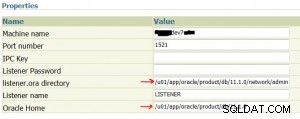Ho testato un paio di varianti (per bigint solo) con funzionalità integrate e questa variante con OVERLAY()
si è rivelato il più veloce nei miei test locali su Postgres 11:
CREATE OR REPLACE FUNCTION varbit2bigint2(b varbit)
RETURNS bigint AS
$func$
SELECT OVERLAY(bit(64) '0' PLACING b FROM 65 - bit_length(b))::bigint
$func$ LANGUAGE SQL IMMUTABLE;
Altri candidati:
Nota la diversa conversione di stringhe di bit vuote ('' ) a 0 rispetto a NULL . Adattati alle tue esigenze!
La tua funzione:
CREATE OR REPLACE FUNCTION varbit2bigint1(b varbit)
RETURNS bigint AS
$func$
SELECT CASE bit_length($1)
WHEN 1 THEN $1::bit(1)::bigint
WHEN 2 THEN $1::bit(2)::bigint
WHEN 3 THEN $1::bit(3)::bigint
WHEN 4 THEN $1::bit(4)::bigint
WHEN 5 THEN $1::bit(5)::bigint
WHEN 6 THEN $1::bit(6)::bigint
WHEN 7 THEN $1::bit(7)::bigint
WHEN 8 THEN $1::bit(8)::bigint
WHEN 9 THEN $1::bit(9)::bigint
WHEN 10 THEN $1::bit(10)::bigint
WHEN 11 THEN $1::bit(11)::bigint
WHEN 12 THEN $1::bit(12)::bigint
WHEN 13 THEN $1::bit(13)::bigint
WHEN 14 THEN $1::bit(14)::bigint
WHEN 15 THEN $1::bit(15)::bigint
WHEN 16 THEN $1::bit(16)::bigint
WHEN 17 THEN $1::bit(17)::bigint
WHEN 18 THEN $1::bit(18)::bigint
WHEN 19 THEN $1::bit(19)::bigint
WHEN 20 THEN $1::bit(20)::bigint
WHEN 21 THEN $1::bit(21)::bigint
WHEN 22 THEN $1::bit(22)::bigint
WHEN 23 THEN $1::bit(23)::bigint
WHEN 24 THEN $1::bit(24)::bigint
WHEN 25 THEN $1::bit(25)::bigint
WHEN 26 THEN $1::bit(26)::bigint
WHEN 27 THEN $1::bit(27)::bigint
WHEN 28 THEN $1::bit(28)::bigint
WHEN 29 THEN $1::bit(29)::bigint
WHEN 30 THEN $1::bit(30)::bigint
WHEN 31 THEN $1::bit(31)::bigint
WHEN 32 THEN $1::bit(32)::bigint
WHEN 33 THEN $1::bit(33)::bigint
WHEN 34 THEN $1::bit(34)::bigint
WHEN 35 THEN $1::bit(35)::bigint
WHEN 36 THEN $1::bit(36)::bigint
WHEN 37 THEN $1::bit(37)::bigint
WHEN 38 THEN $1::bit(38)::bigint
WHEN 39 THEN $1::bit(39)::bigint
WHEN 40 THEN $1::bit(40)::bigint
WHEN 41 THEN $1::bit(41)::bigint
WHEN 42 THEN $1::bit(42)::bigint
WHEN 43 THEN $1::bit(43)::bigint
WHEN 44 THEN $1::bit(44)::bigint
WHEN 45 THEN $1::bit(45)::bigint
WHEN 46 THEN $1::bit(46)::bigint
WHEN 47 THEN $1::bit(47)::bigint
WHEN 48 THEN $1::bit(48)::bigint
WHEN 49 THEN $1::bit(49)::bigint
WHEN 50 THEN $1::bit(50)::bigint
WHEN 51 THEN $1::bit(51)::bigint
WHEN 52 THEN $1::bit(52)::bigint
WHEN 53 THEN $1::bit(53)::bigint
WHEN 54 THEN $1::bit(54)::bigint
WHEN 55 THEN $1::bit(55)::bigint
WHEN 56 THEN $1::bit(56)::bigint
WHEN 57 THEN $1::bit(57)::bigint
WHEN 58 THEN $1::bit(58)::bigint
WHEN 59 THEN $1::bit(59)::bigint
WHEN 60 THEN $1::bit(60)::bigint
WHEN 61 THEN $1::bit(61)::bigint
WHEN 62 THEN $1::bit(62)::bigint
WHEN 63 THEN $1::bit(63)::bigint
WHEN 64 THEN $1::bit(64)::bigint
ELSE NULL::bigint
END
$func$ LANGUAGE SQL IMMUTABLE; -- no STRICT modifier
Riempimento sinistro della rappresentazione del testo con '0':
CREATE OR REPLACE FUNCTION pg_temp.varbit2bigint3(b varbit)
RETURNS bigint AS
$func$
SELECT lpad(b::text, 64, '0')::bit(64)::bigint
$func$ LANGUAGE SQL IMMUTABLE;
Cambio di bit prima del cast:
CREATE OR REPLACE FUNCTION varbit2bigint4(b varbit)
RETURNS bigint AS
$func$
SELECT (bit(64) '0' || b << bit_length(b))::bit(64)::bigint
$func$ LANGUAGE SQL IMMUTABLE;
db<>violino qui
Correlati:
Il tuo feedback
Mostri un STRICT modificatore con bigint variante della funzione nella domanda (non sono sicuro del motivo per cui differisce da integer variante). Se rappresenta la funzione che hai effettivamente testato, mi aspetto che la maggior parte della differenza di prestazioni osservata sia dovuta a quella aggiunta di STRICT modificatore che impedisce l'integrazione della funzione . Citando il wiki di Postgres:
Ciò sembra danneggiare gravemente la tua funzione, mentre il mio vincitore sembra inalterato e le altre due varianti sono addirittura del 10% più veloci. Stesso gioco con STRICT funzioni:
db<>violino qui
Correlati:
Ti suggerisco di ripetere il test con e senza STRICT modificatore da vedere di persona.




